It’s not your imagination: food prices are rising all the time. It’s particularly noticeable when you buy items infrequently. Like sunflower oil. When did it get to more than R60 for a two litre bottle? Don’t even start with butter. It wasn’t all that long ago it would be on special for R20 a block; now you’re lucky to get two for R100, and it’s climbing.
Sure, you can shop sensibly, seek out “bargains”, but it annoys the hooha out of me when I see a certain retailer splashing an ad on the TV bragging about its daily difference deals and I know full well the same thing is available for less somewhere else.
Author, television producer and presenter, father and farmer Justin Bonello, who founded Neighbourhood Farm in the South Peninsula, says our food system is broken. Sitting on a bench in the market garden, Bonello is leaning forward and pulling out weeds as we chat. “When I started building this project – I did a show with Woolworths all those years ago – and at the time I thought I knew our food production systems, but I came out of it realising I actually knew very little. We have a broken food system, and it’s broken in many respects,” he said.
“It’s the disconnect between farmer and consumer, it’s the trust and faith we put into retailers which isn’t warranted, it’s the fact the farmer gets screwed over on the front side – a prime example, when mangoes were in season at Epping market you could buy nine for R45; the same time in Woolies it was two for R45. That’s why I started this.”
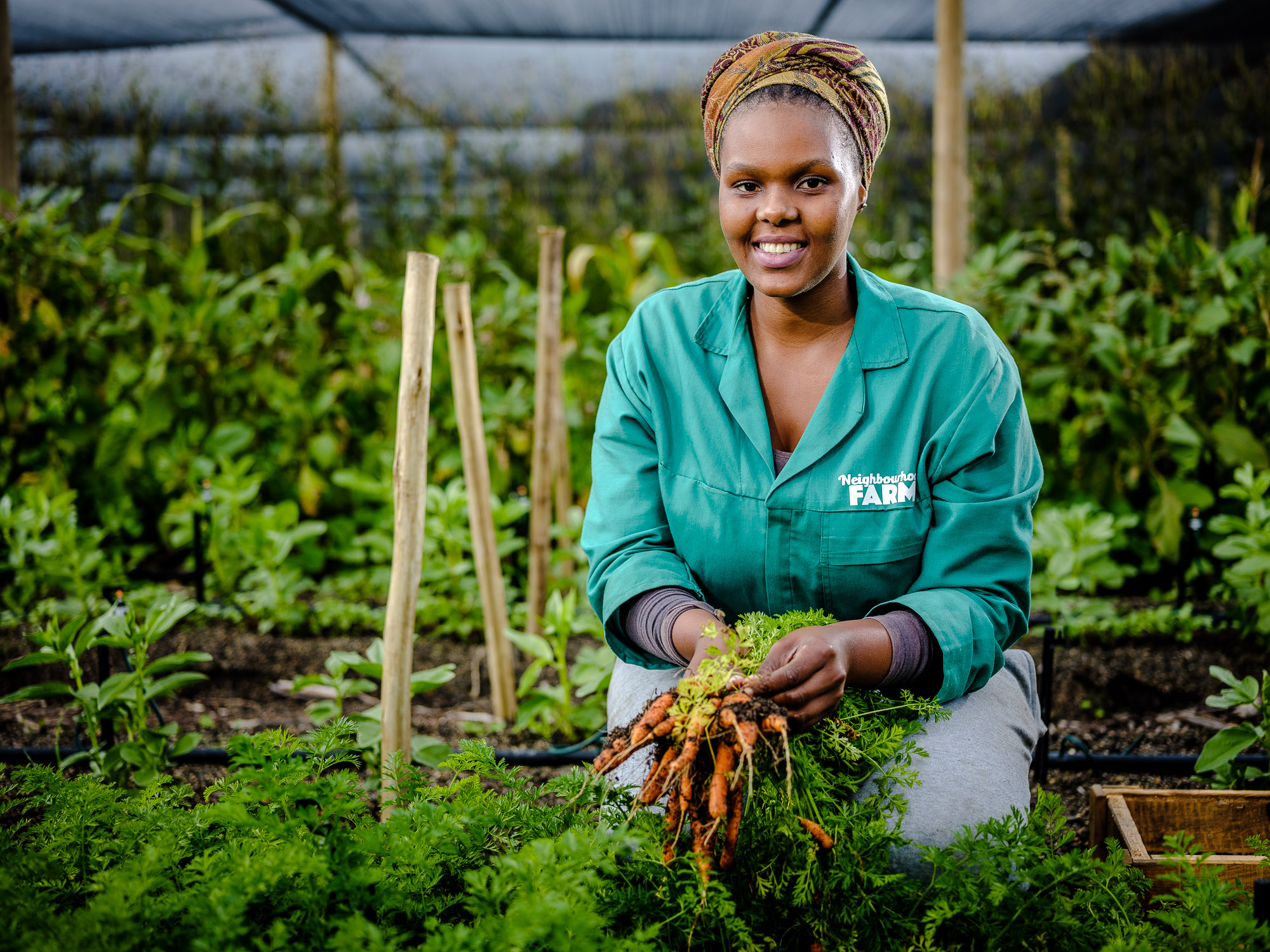 Alice Sithole is a head market gardener at Neighbourhood Farm. (Photo: John Armstrong)
Alice Sithole is a head market gardener at Neighbourhood Farm. (Photo: John Armstrong)
There were two tipping points for Bonello. The first was meeting a seventh generation farmer in the Karoo while filming a show. “You immerse yourself in their lives, and he said to me ‘Justin, when I started farming 50 years ago, 200 lambs to market would pay for a new bakkie. Today, 200 lambs to market don’t even pay for the deposit on a bakkie. What has happened to what I do that I am worth so little? I know the answer now. This is the truth of it. I work harder than I’ve ever done, I am a custodian of the land, and get pressure put on me the whole time’.
“The answer is simple,” said Bonello. “In the old days, farmers and consumers were connected. Over the last 150 years the gap has grown, more so as we moved into cities. The farmer is disconnected from his market, there’s a whole series of middlemen between them and us, and they don’t take the risk of drought or stock theft or whatever. They just add their markup and it lands up at a retailer. I believe we pay what we should for food, but the benefit doesn’t go back to the farmer.”
The second catalyst was when Bonello encountered a conservation-minded farmer who had put out a trap after his Jack Russell got eaten, and caught a leopard – 10 metres from his house.
“We darted it, collared it and released it back into the wild, and I started thinking how do you bring food into the forefront of the mind of your community? So much out there is unseen. The average person who bites into a lamb chop doesn’t understand there have been a whole slew of animals’ deaths to get that lamb chop on the plate, from gin traps to hunting dog packs, taking out caracal, leopard, jackal, and that’s an untold side of the food story.”
Initially, Bonello’s first instinct was to make a show, because that’s what he did. “Raising money for shows is really difficult, so I started exploring the urban environment,” he said. “We know 70% of the world’s population will live in cities – Africa is already there. “This is for me where you’ve got to do your work. The more people who move into urban environments is in some respects better for the rural environments and the wild environments.
“I started fiddling and looking at gardens. I knew it had to have an educational element, but when I delved deeply into it, I started seeing huge failure rates – 90% of urban farms in SA don’t survive. We had to build an economic model, which is housed in an NPO so you can access grants and donor funding, but this mindset of coming back all the time and saying ‘please sir can I have some more?’ is not what I wanted. If you lose a donor, everything can fold because you’re relying too heavily on the handouts. It had to be a system of quid pro quo where it paid its own way… which led me into market gardens.”
 Supporting an urban farm benefits the economy of a community. (Photo: John Armstrong)
Supporting an urban farm benefits the economy of a community. (Photo: John Armstrong)
Neighbourhood Farm has PBO status (public benefit organisation); you are allowed to give up to 10% of your taxable income you would otherwise give to SARS, to registered PBOs. This way you get to control that 10% and where it goes, and you were going to have to part with it anyway. I can’t see any way this is not a win-win situation.
To establish these gardens, Bonello’s research steered him in the direction of French market gardens in the 1500s, which had highly productive growing techniques to maximise yield, and to find available land in the urban environment. “We identified hospitals and schools. We have a big garden at Kommetjie Primary, this is False Bay Hospital. We built one at Laërskool Paul Greyling, and we built smaller gardens at Kleinberg Primary, Marine Primary, and Bay Primary, but they are more like outdoor classrooms where kids can go outdoors and connect with nature.
“We put in the infrastructure and provide training. We built a 6,000 square metre training farm in Ocean View and took 20 community members and did some initial training, identified the talent, then cut it down to 10. Four months away from handing the site over to the community, there were two armed robberies on school premises and the board said ‘you’re out of here’ so we accelerated the handover faster than it should have been. They’re running it as their own enterprise, which is kind of what it has to be.”
The gardens are not only a source of food but a way of getting back in touch with where food comes from. “I call city dwellers the ‘forgetting generation’ because as they go down their path, if parents and grandparents don’t pass knowledge on to their children and grandchildren, that knowledge is gone and forgotten,” said Bonello. “A loaf of bread is a typical example. If you bake it at home you know you can get away with five ingredients – sugar, water, salt, flour, yeast – or even fewer. Store-bought bread can contain anywhere between 20 and 37 ingredients. That’s across the entire food chain.
“What I hate about the food system now is that corporates recognise opportunity, then they wipe out the little guys that play in that space, and those are the people that are really important because they maintain the wellbeing of the economy, that food democracy of money rotating in your own community and that’s all gone thanks to corporates who saw a gap.
“Once they’ve got you, they can do whatever they like so local butchers are closed, then they can put the prices up because there’s no competition. I think it was in 2017, the top four retailers in SA made a R17-billion net profit. All they are doing is servicing shareholders’ pockets. They’re not servicing us any more.”
There’s no denying the convenience of a supermarket where everything from loo paper to lemons is available in one place. The flip side is purpose, which is when you make a decision to go to a place like the farm or to your local baker, said Bonello. “People don’t understand, they think it is more expensive – and in some cases it is – but what they forget is that you’re not getting a mass produced homogenised item. You’re getting ethics, and you’re keeping money in your own community.”
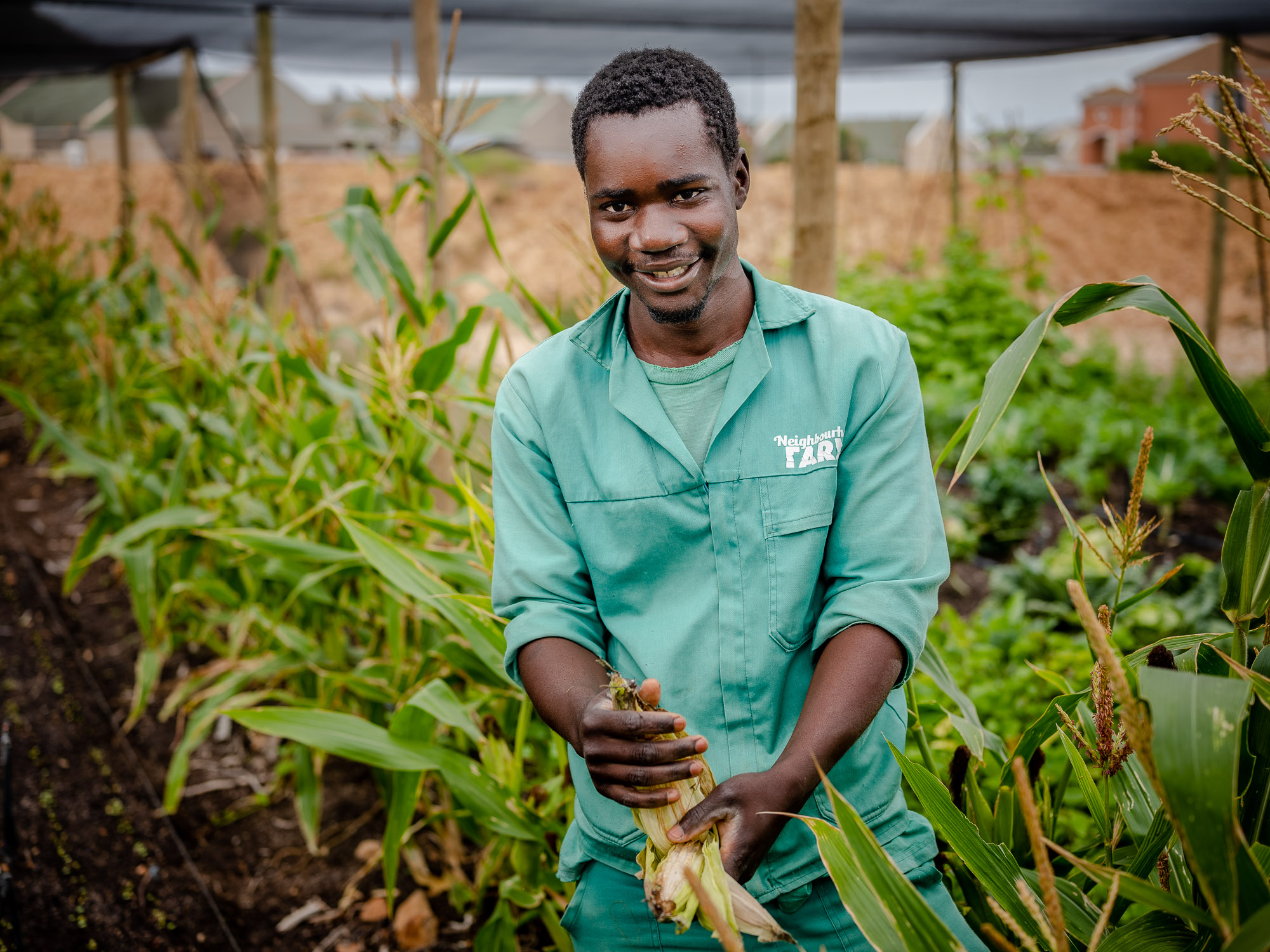 Head market gardener Efias Banda. (Photo: John Armstrong)
Head market gardener Efias Banda. (Photo: John Armstrong)
It gets worse. “If you’re that urban dweller of the forgetting generation, you haven’t had this in your life and you see no reason to have it in your life. We see it in the customers and members of the community who come to the shop. There are two types: middle class to affluent, who have the money, awareness and all the rest of it; and sick people. It’s when they’ve got cancer or other diseases, that’s when they start looking at the food they’re eating. The irony is, people will spend as little as they can on their food, and more on gym and medical aids. It makes no sense to me. Spend more on your food and you’ll need to spend less on your health.”
Bonello likes to think of gardens as probably the best educational resource you can have. “One of the saddest things is that we’ve had no kids here during Covid. Half this thing is kids,” he said, indicating the False Bay Hospital garden. “If you can catch them now you can re-educate them. Let them pull a carrot out of the ground and start giving them edible education,” he said.
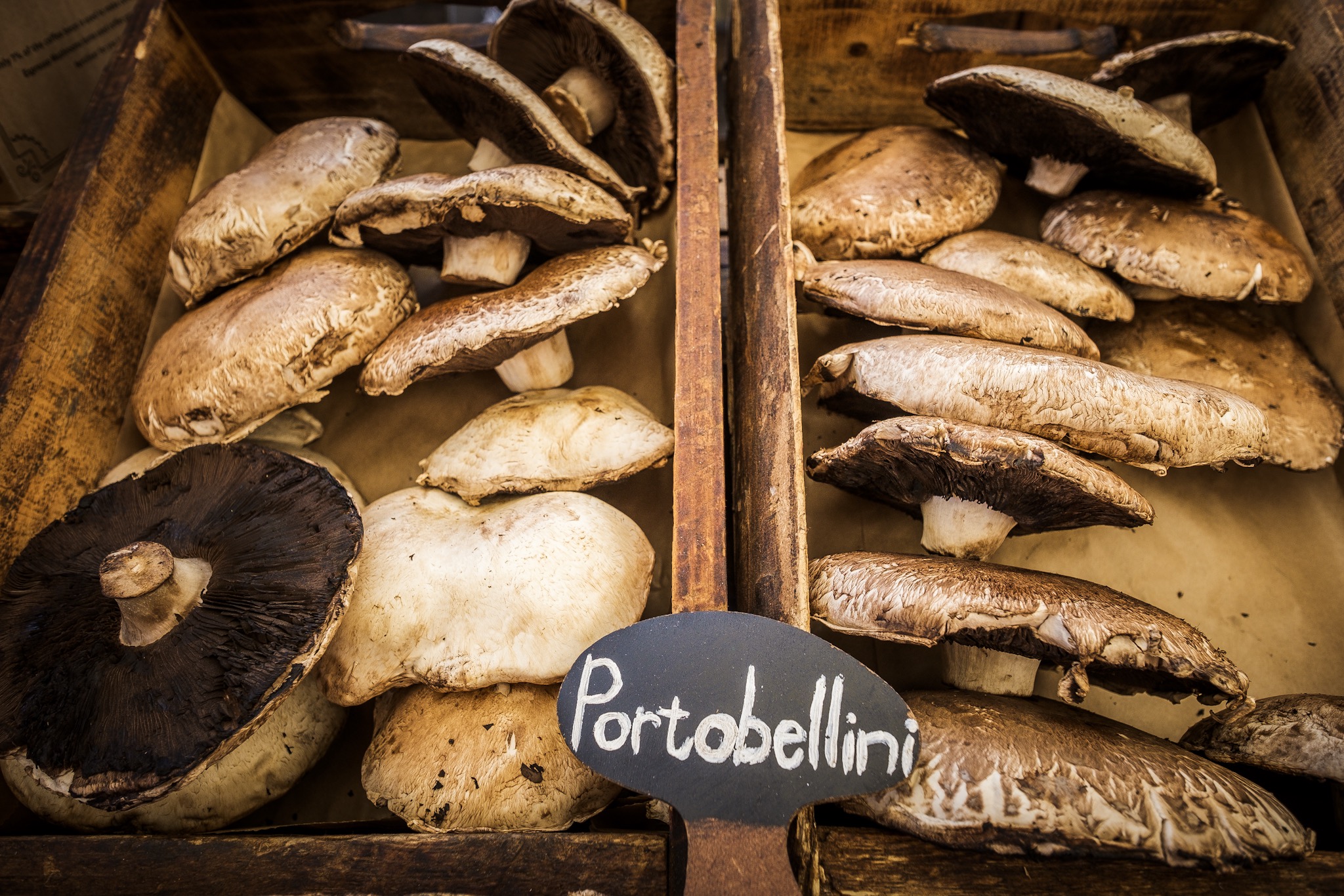 Produce from Neighbourhood Farm is available to buy from two shops in the South Peninsula, and every second week or so from Oranjezicht City Farm Market at the V&A Waterfront. (Photo: Supplied)
Produce from Neighbourhood Farm is available to buy from two shops in the South Peninsula, and every second week or so from Oranjezicht City Farm Market at the V&A Waterfront. (Photo: Supplied)
“Gardens are amazing and people don’t see the value in them. It’s simple – you reap what you sow, and a garden can teach you exactly that. You plant a seed, nurture it and at some point you’ll get a harvest. That’s a life lesson. It’s also an economic lesson: if I’ve got nine cabbages worth R15 each, and a four month growth period… and that square metre can generate that much income, and it’s a maths lesson too. Biology. The minute you pull a carrot out you’ve got a tap root, you’ve got photosynthesis. Why do we have shade netting? Geography lesson – we get murdered by the south-easter and north-wester, it breaks the wind, decreases evaporation, keeps freeloading wildlife away from the crops.
“One of the challenges we face is how to integrate gardens into the curriculum. I see education as the children get their hands dirty and get connected with the earth. You need to find those special educators or you need to find someone in authority to change the system and say this should be the status quo.”
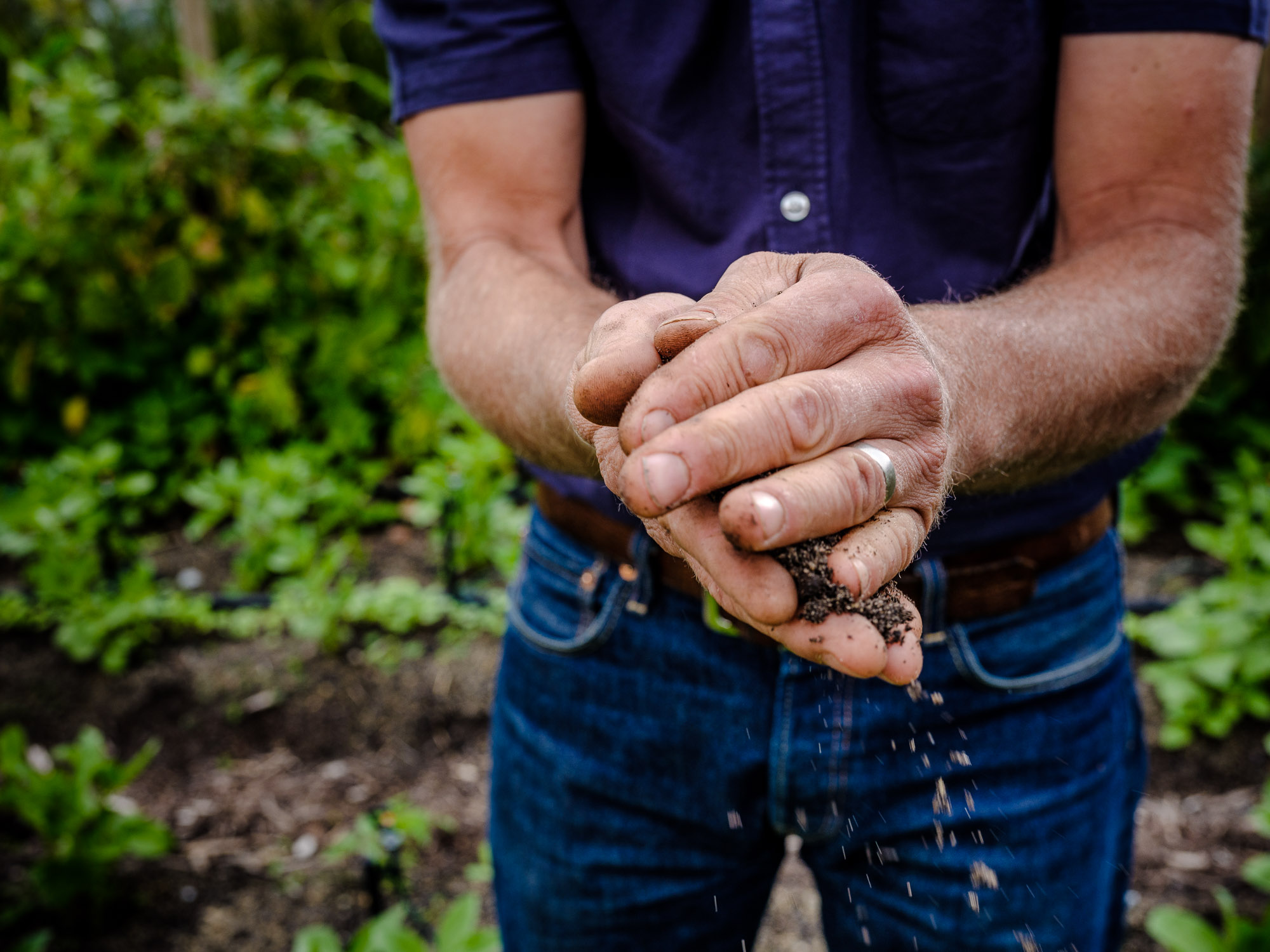 Gardens are the best way to teach people how to reconnect to the earth and where their food comes from. (Photo: John Armstrong)
Gardens are the best way to teach people how to reconnect to the earth and where their food comes from. (Photo: John Armstrong)
The gardens are organic and support eco systems which include frogs and birds and the things they eat, like snails and worms, ladybirds that follow the aphids, and bees that pollinate the plants. Ducks and chickens roam, providing the best manure possible – that which has been through a digestive system.
Produce is seasonal, and in winter cucumbers and tomatoes aren’t available from the garden, so the aim is diversity within species. “We grow three types of beetroot, five types of radish, 10 types of lettuce, five types of spinach. We still have to bring in out-of-season stuff, I wish it wasn’t like that but I have no choice,” said Bonello. “For me, if we fix food we fix everything; grow hyper locally and it’s going to your community and their money is circulating. You’re not being strip mined by corporates. You’re really working a productive food system.”
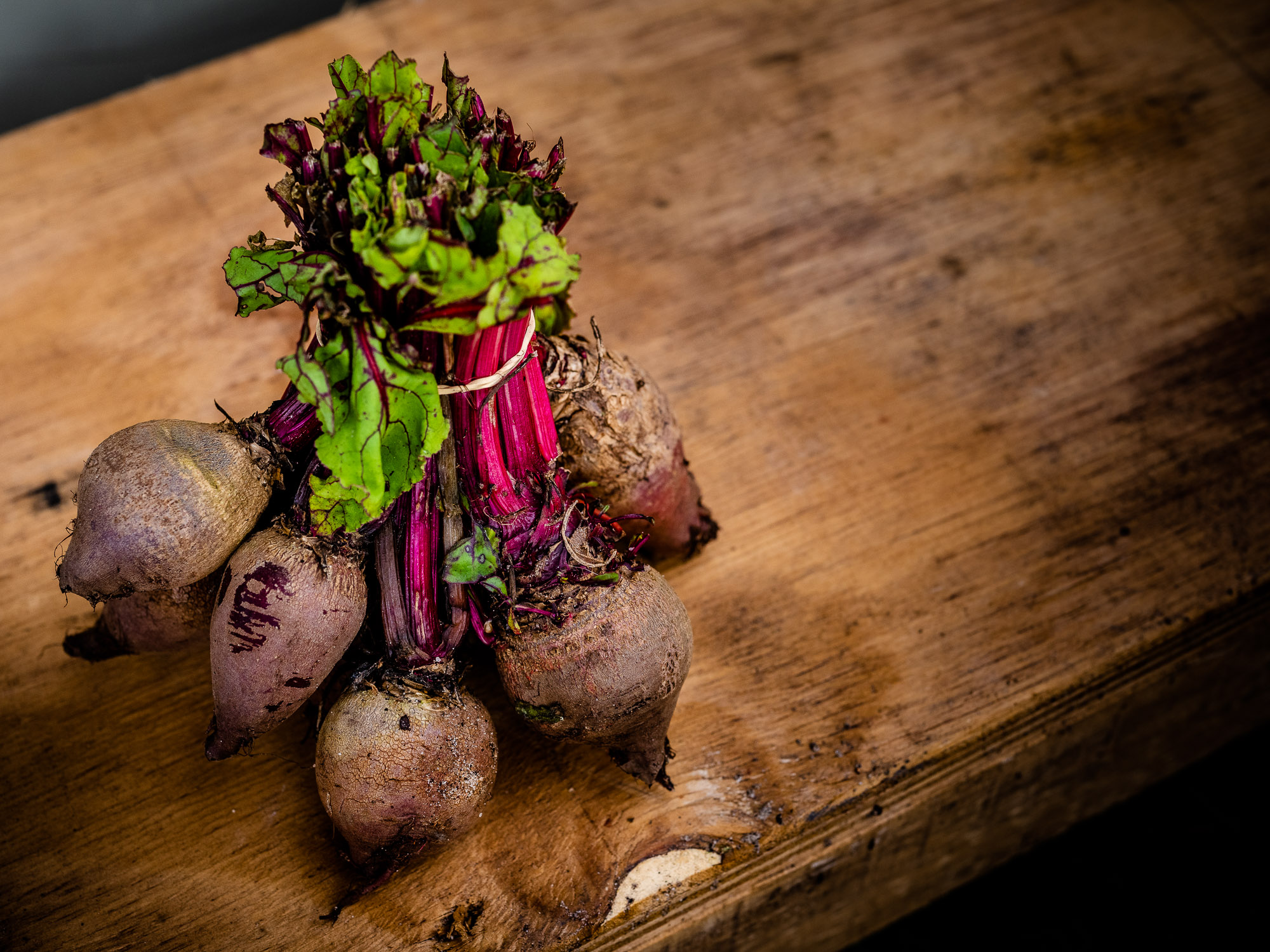 One of three types of beetroot grown at Neighbourhood Farm. (Photo: John Armstrong)
One of three types of beetroot grown at Neighbourhood Farm. (Photo: John Armstrong)
There are two little shops, one at the False Bay Hospital location, the other in Kommetjie. “We sell to restaurants and other organic on-sellers, but it’s difficult to convert restaurants. We send to Oranjezicht City Farm Market every second week or so.
“The South Peninsula has more organic farms than anywhere else in Cape Town. We need market access and we need a space dedicated to us,” said Bonello. “The shops work but if you want to get more into the social consciousness, you need to get more people to come in and support what you’re doing.”
Bonello is the author of several cook books, and has produced and hosted multiple television series which have aired globally. He’s currently in the Eastern Cape shooting season seven of the reality show Ultimate Braai Master, which has won four Saftas (South African Film and Television Awards). “Trace Media bought the rights to the show, so I’m still the creative director. I was always jealous of Pete [Goffe-Wood] and Benny [Masekwameng] when I was on the production side, because I was always working my arse off and they really got to enjoy themselves. This time I get to do that too.” DM/TGIFood
Ultimate Braai Master will air at the end of September 2021 on e.tv and Netflix. For more information about Neighbourhood Farm, click here, and about Bonello here.
There’s much more from Tony Jackman and his food writing colleagues in his weekly TGIFood newsletter, delivered to your inbox every Friday. Subscribe here. Also visit the TGIFood platform, a repository of all of 0ur food writing.
The writer supports Ladles of Love, which will attempt to build the longest line of food cans and beat the current world record on August 29, 2021 at the V&A Waterfront.




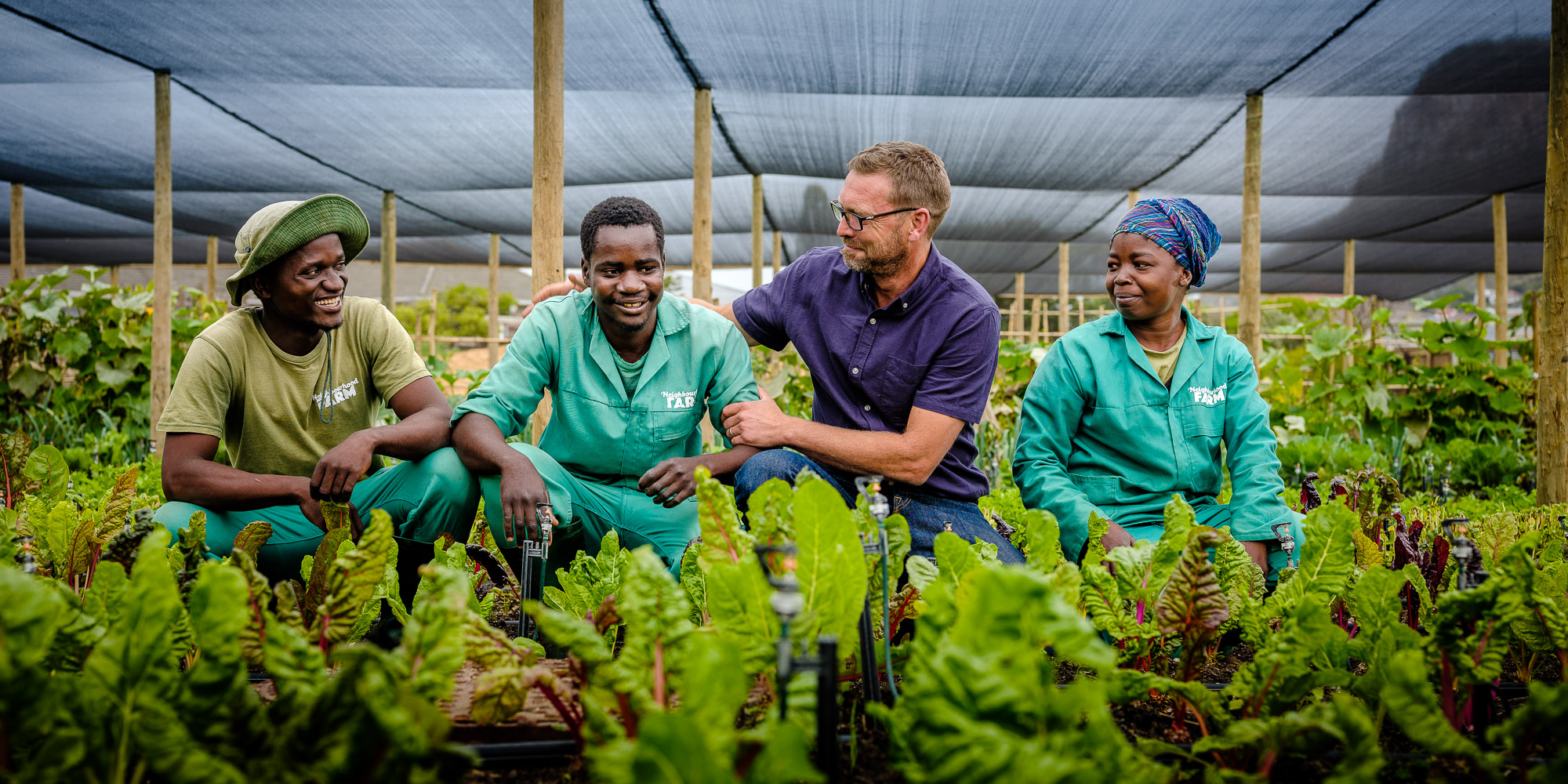 One of three types of beetroot grown at Neighbourhood Farm. (Photo: John Armstrong)
One of three types of beetroot grown at Neighbourhood Farm. (Photo: John Armstrong) 